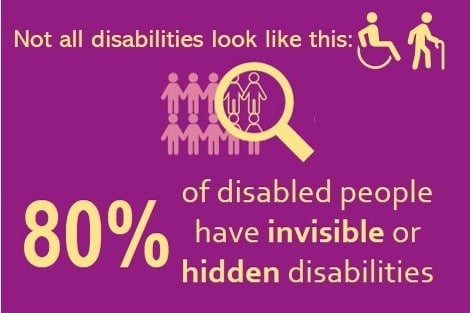Information Hub
Disability
What do we mean by the term ‘Disability’?
When does someone have a long term health condition but is not defined as disabled?
When does a person have an impairment but does not consider themselves disabled?
These are common questions that an employer may have when thinking about recruiting or retaining staff.
Under the Equality Act 2010, disability is defined as: “A physical or mental impairment which has a substantial and long-term adverse effect on your ability to carry out normal day-to-day activities.”
In terms of the Equality Act definition, the term impairment means condition. It may be physical, mental or both. But whether a condition is a disability will, in most cases, depend on all the facts and circumstances of the individual case. Whether a person is disabled, for the purposes of the Act is generally determined by the effect an impairment has on a person’s ability to carry out normal day-to-day activities. It is important to note that not all people will be limited by their condition or disabled by their environment.
It is not possible to provide an exhaustive list of conditions that qualify as impairments for the purposes of the Equality Act, as this may change with advances in medical knowledge. However, in terms of disability, this can arise from a wide range of impairments:
- sensory – such as those affecting sight or hearing
- impairments with fluctuating or recurring effects – for example rheumatoid arthritis, myalgic encephalitis (ME), chronic fatigue syndrome (CFS), fibromyalgia, depression and epilepsy
- progressive – motor neurone disease, muscular dystrophy, and forms of dementia
- auto-immune conditions – systemic lupus erythematosis (SLE), Type 1 Diabetes
- organ specific – including respiratory conditions (such as asthma) and cardiovascular diseases (including thrombosis, stroke and heart disease)
- neuro-diverse – autistic spectrum disorders (ASD), dyslexia and dyspraxia
- learning disabilities
- mental health conditions with symptoms including anxiety, low mood, panic attacks, phobias, or unshared perceptions; eating disorders; bipolar affective disorders; obsessive compulsive disorders; personality disorders; post traumatic stress disorder, and some self-harming behaviour
- mental illnesses – such as depression and schizophrenia
- impairment as a result of injury to the body – for example loss of limb or to the brain.

To meet the definition of disability according to the Equality Act, a person would generally have to show that their condition has a substantial and long-term adverse effect on their ability to carry out normal day-to-day activities in order to be protected under the act. Substantial means more than minor, but it may fluctuate or change, and may not be present all the time. Long-term means lasting at least a year, or likely to be for the rest of the person’s life or recurring.
Confused?
Here are some examples:
- A member of staff recently discloses that they have been diagnosed with severe anxiety and depression. Their GP has referred them for CBT (cognitive behavioural therapy) but has encouraged the individual to remain in work as much as possible, so they are not isolated at home. They are unlikely to recover in less than 12 months and when their anxiety is severe, it can have an impact on how they function at work. In this case, the member of staff does have a condition that meets the definition of disability under the Equality Act and their employer would have a duty to make reasonable adjustments.
- A member of staff has a prosthetic limb, which for the most part does not cause them a lot of pain. They do not use any physical aids to help them walk and have a good pain management system in place when needed. Whilst they do have an impairment which will exist for the rest of their life, it does not have a significant impact on their ability to carry out their day-to-day tasks at work and as a result, they do not consider themselves to be disabled. However, if their condition deteriorates (for example resulting in tiredness, increased physical pain), a reasonable adjustment could be considered to allow for regular breaks whilst at work. It is also worth noting that whilst the person does not consider themselves disabled, they would still be afforded protection under the Equality Act, even though an adjustment is not needed in this case.
- A member of staff has Type 2 Diabetes. They have had this condition for many years and it is a condition that will be long term. They do not take medication and the condition has no impact on their ability to carry out their job. Whilst the individual would be considered as having a long-term health condition which can fluctuate over time, the effects of the condition (ie nil or minor) mean that it would not meet the definition of disability under the Equality Act.
- A member of staff has a hearing impairment and works in an office environment. Day-to-day they can hear adequately, and no adjustments are required. However, when they are in busy meetings or training sessions, with lots of discussion, they struggle to hear and may need some adjustment, such as a piece of equipment or speech-to-text operator. In this case, a change in environment has resulted in their impairment becoming a disability and, therefore, requiring a reasonable adjustment.
Usually, there will not be disagreement in the workplace over whether an employee has a disability and, on the whole, it is best practice to focus on agreeing reasonable adjustments rather than trying to establish whether or not a condition meets the Equality Act definition.
See the Reasonable Adjustments in Practice section of the information hub for examples of reasonable adjustments and what is, and is not, considered reasonable.
For further information:
- Devon County Council: Diversity Guide – Disability
- ACAS pdf document: Disability discrimination: key points for the workplace (pages 3 to 7)
For more detailed information on any aspect of disability and employment, please go to our Information Hub page. Alternatively, you can contact the project team either via our on-line form or call us on 01392 241124.
Please note: we are not responsible for the contents or reliability of linked websites and do not necessarily endorse the views expressed within them. Listing shall not be taken as endorsement of any kind. We cannot guarantee that these links will work all of the time and we have no control over availability of the linked pages.
We do not object to you linking directly to the information that is hosted on this website and you do not need permission to do so.
